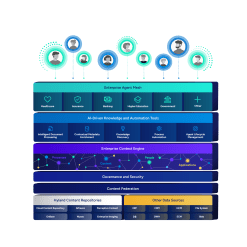DICTU
Dutch government improves document and case management system with Hyland's Alfresco platform.

Harness the power of a unified content, process and application intelligence platform to unlock the value of enterprise content.
Learn more
Automate your document-centric processes with AI-powered document capture, separation, classification, extraction and enrichment.
Learn about Hyland IDPIt's your unique digital evolution … but you don't have to face it alone. We understand the landscape of your industry and the unique needs of the people you serve.
 Overview of industries
Overview of industries
Countless teams and departments have transformed the way they work in accounting, HR, legal and more with Hyland solutions.
 Overview of departments
Overview of departments
We are committed to helping you maximize your technology investment so you can best serve your customers.
 Overview of services
Overview of services

Discover why Hyland is trusted by thousands of organizations worldwide.
Hear from our customers
Our exclusive partner programs combine our strengths with yours to create better experiences through content services.
Overview of partners
Join The Shift newsletter for the latest strategies and expert tips from industry leaders. Discover actionable steps to stay innovative.
Register now
Hyland connects your content and systems so you can forge stronger connections with the people who matter most.
Learn about HylandWith our modern, open and cloud-native platforms, you can build strong connections and keep evolving.
 Dig deeper
Dig deeper
Reading time minutes
Dutch government improves document and case management system with Hyland's Alfresco platform.
DICTU (Dienst ICT Uitvoering), based in the Netherlands, is one of the largest IT service implementation organizations within the Dutch government, which has a potential customer base of almost 500,000 internal users.
With 12 separate ministries and as many as 50 independent internal organizations — all with their own IT implementations and proprietary software — the Dutch government has a complicated IT landscape.
The government needed a way to simplify IT across all internal organizations, making it easier to manage its internal cases and documents and keep all information in one case management system. It also wanted to standardize its business workflows, improve overall transparency and efficiency, monitor quality and lead time, and maintain a user-friendly experience for its employees and citizens.
Compliance was also a big driver for standardization, along with finding a scalable and cost-effective solution that made the most of taxpayer dollars.
— Erik Bosveld, Program Manager, DICTU
The RijksZaak platform was created to replace a large number of the government's disparate proprietary systems. Developed by DICTU, one of the largest IT service provider to the Dutch government, RijksZaak features several applications, including Hyland's Alfresco platform, which serves as RijksZaak's case and document management solution.
"In the last year, we have brought six customers live and are working on another 10," said Erik Bosveld, DICTU's large infrastructure program manager. "Our immediate goal is to have at least another 20 customers on the platform in the next 24 months and to increase our speed in bringing those customers live."
Workflow is customized for each customer, and though it took about two years to build the entire RijksZaak platform and get the first customer live, Bosveld said the process has moved exponentially faster with each new implementation.
"Whenever you start standardizing primary processes in government, it takes time, but there has been a lot of interest," Bosveld said. "It's a lot cheaper than building a custom platform and quicker to implement. We take about three to six months to build. For a proprietary solution, it could take as long as two to three years. That's definitely one of the selling points of Alfresco over legacy content management systems."
End users of Alfresco include Dutch government employees, who use the platform to initiate cases, manage records, complete workflows, store documents and maintain overall compliance.
For example, Bosveld said, an inspector with the Ministry of Transport might use the platform to file a report of a damaged road barrier. A case can be created and filed through a mobile device and sent to the main office, where subcontractors can then pick up the case and engage with insurance companies to process the claim. Once the damage has been paid for and the barrier replaced, the case can be closed and digitally archived within Alfresco.
Dutch citizens can also access the platform as they engage with the government (digitally submitting cases and applying for licenses and permits, for example).
Today, RijksZaak has replaced 20-25 business applications, which has been very convenient for the ministries and organizations using the platform, Bosveld said.
The biggest challenge has been shifting the mindset of replacing legacy tools from that of a technical implementation to an organizational — and in some cases, a cultural — change.
"We talk to our customers on a regular basis, and we hear that it is very convenient to have everything summed up in one platform. They find it easy to use and much more efficient," Bosveld said. "We haven't had to do much marketing because the ministries are coming to us. For those already using it, it's mostly been a big success. The Netherlands is a pretty small country. Though we have about a half a million people working in the central government, it's a very small world and word spreads very fast."